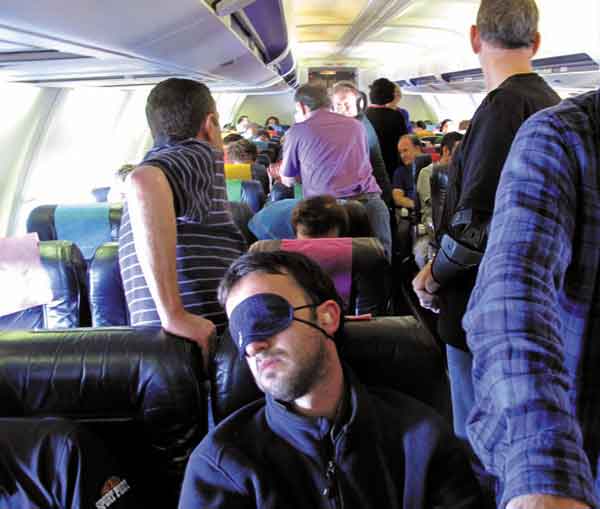It’s August, and Americans by the millions are cramming themselves into coach-class seats as they embark on their summer vacations.
Those able to learn from adversity might ponder this: Airline seating may be the best concrete expression of what’s happened to the economy in recent decades.
Airlines are sparing no expense these days to enlarge, upgrade and increase the price of their first-class and business-class seating. As the space and dollars devoted to the front of the planes increase, something else has to be diminished, and, as multitudes of travelers can attest, it’s the experience of flying coach. The joys of air travel — once common to all who flew — have been redistributed upward and are now reserved for the well-heeled few.
The new business-class seats that Lufthansa is installing convert to quasi-beds that are 6 feet 6 inches long and two feet wide, The New York Times’ Jad Mouawad reports. The price for working, eating, drinking and sleeping on this commodious couch, round-trip from Kennedy airport to Frankfurt and back, is a cool $5,000.
Lufthansa is hardly alone. Delta, United and American all have announced plans to upgrade their business-class seats for cross-country and transcontinental flights. Then there’s Emirates, which now sells first-class suites — complete with a shower — that go for a tidy $19,000 on the New York-Dubai route.
At the other end of the economic spectrum, low-cost airlines that re-create the thrill of traveling in steerage are thriving, too. The new business model, apparently, is to shrink the seats, charge extra for everything and offer nothing for free that might be construed as an amenity.
That’s certainly the credo of Spirit Airlines, which charges its benumbed passengers a fee for their carry-on bags, $3 for water and $10 for printing out boarding passes and whose seats don’t recline.
Spirit boasts one of the highest profit margins in the industry and plans to expand by 15 percent to 20 percent every year for the next eight years, according to the Los Angeles Times. It also ranks dead last in customer satisfaction — indeed, in last year’s Consumer Reports survey, it had one of the lowest overall customer satisfaction scores of any company in any industry that the magazine had ever surveyed.
But people fly Spirit Airlines because the fares are what they can afford.
The upgrading of business and the downgrading of coach present a fairly faithful mirror of what’s happening in the larger economy: the disappearance of the middle class.
As University of California-Berkeley economist Emmanuel Saez has documented, between 2009 and 2011, the incomes of the wealthiest 1 percent of American families grew by 11.2 percent while those of the remaining 99 percent shrunk by 0.4 percent. Median household income has declined every year since 2008.
Profits, meanwhile, have risen to their highest share of the nation’s economy since World War II, while wages have sunk to their lowest share. In an economy such as this, the growing markets are the rich and corporations, which have more money to spend on luxury travel, and the downwardly mobile everyone else, whose travel options are increasingly confined to discount outfits like Spirit and the increasingly hellacious coach sections of other airlines.
Last week, one of the last airlines devoted to what we might call a middle-class travel experience succumbed to the increasing economic bipolarization of U.S. consumers. JetBlue, which has never had a first-class or business section but which afforded its coach customers more legroom than other airlines, announced that it would create a new first-class section on its cross-country flights with suites containing seats that fold down to full lie-flat beds.
In an unusually concrete way, JetBlue’s change of cabin configuration highlights what the changes to our broader economy have meant. Its ability to provide its customers with more spacious seats was the direct result of not having a first-class section. Airplanes, like stagnating economies, are finite, and if one class takes up more space or commands more resources, the other class gets less.
The U.S. economy has not stagnated over the past four decades, but so much of its wealth has been claimed by the very top that most Americans have experienced it as a zero-sum game in which they’ve lost ground.
As tax rules favored the wealthy, as employees lost the power to bargain for their wages, as globalization reduced the incomes of millions of workers, the rich grew richer at everyone else’s expense. That’s the reality that today’s air travel illustrates, as the comfortable standard seat that once was the norm goes the way of the dwindling middle class.
Harold Meyerson is editor-at-large of The American Prospect. This column was distributed by The Washington Post, where it first appeared.
Send questions/comments to the editors.



Success. Please wait for the page to reload. If the page does not reload within 5 seconds, please refresh the page.
Enter your email and password to access comments.
Hi, to comment on stories you must . This profile is in addition to your subscription and website login.
Already have a commenting profile? .
Invalid username/password.
Please check your email to confirm and complete your registration.
Only subscribers are eligible to post comments. Please subscribe or login first for digital access. Here’s why.
Use the form below to reset your password. When you've submitted your account email, we will send an email with a reset code.